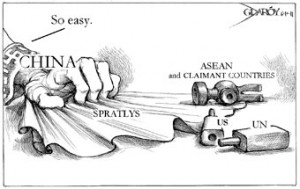The die is cast
Whether to postpone the scheduled elections of the Autonomous Region in Muslim Mindanao was always a complicated question, a difficult judgment call. If it is an act of charity to remember the best arguments for and against postponement, then we should at least recall that distinguished citizens of the ARMM, the very voters whose vote was at stake, could be found on opposite sides of the issue. The die, however, is cast. It is now incumbent on the Aquino administration to ensure that the reforms the postponement is supposed to put in place do not remain merely on the level of good intentions.
A year in office, the administration has demonstrated that on the most contentious issues, it can flex its political muscle in Congress: the passage of a reform budget, the impeachment of Ombudsman Merceditas Gutierrez, the postponement of the ARMM polls to 2013. (Would that this list would soon include the decision not to allow military honors or a burial at the Libingan ng mga Bayani for the late dictator Ferdinand Marcos, despite the revisionist resolution filed in the House of Representatives.) But after a year in office, the administration has yet to convince the general public that it knows how to follow through.
Article continues after this advertisementThe basic idea behind the push for postponement was the culture of corruption and impunity, of transactional politics at its rawest and most violent, that surrounds each act of voting in the ARMM. In the presidential elections of 2004 and the senatorial elections of 2007, election fraud in some ARMM provinces was so massive it helped ensure the election of candidates for national office. In 2009, the mere act of filing a certificate of candidacy for the 2010 elections was considered such a threat and a challenge to the existing order in Ampatuan-controlled Maguindanao that a terrible massacre was perpetrated. To this day, some politicians from the region continue to boast about their so-called command vote, a reality backed by dynastic politics, entrenched bureaucracies and well-equipped private armies.
The postponement is meant to solve some if not most of these problems. The controversial appointment of officers in charge or OICs in the region—a throwback to the first Aquino administration, provided for in the law mandating the synchronization of elections in 2013—is a crucial first step in the search for solutions. Because legal experts considered the proposed disqualification of all OICs from running in the 2013 elections unconstitutional (it would have effectively added a new qualification not found in the Constitution itself), the provision has been dropped. But persons appointed to OIC positions should not contest the 2013 polls. Allowing them to do so would tempt some or most to act with political interests in mind, thus defeating the very purpose of the postponement. Unfortunately, Malacañang is left with only one weapon to prevent OIC appointees from turning themselves into candidates: moral suasion.
We must confess to a slight sense of pessimism; we hope the administration can specify the measures it will put in place, between now and when the first OICs are named in September, to stop ambitious appointees from making a mockery of the ARMM reform agenda.
Article continues after this advertisementBut that matter is small beer compared to the daunting task of dismantling the private armies. Part of the answer lies in supporting the units of the Armed Forces of the Philippines in the area with top-level backing; that way, they will not be at the mercy of local politicians or political opportunism. Another part must lie in the dangerous but necessary example-setting of the OICs; they cannot have their own private armies while seeking to disarm those of other politicians. It is a complicated operation, and the Aquino administration has less than two years to make it work.
Not least, the moneys that pour into the ARMM’s coffers must be given the strictest accounting. This may even be more arduous than the dismantling of the private armies, and will certainly be more tedious. But for too long a political tradition that treats public funds as entirely at the discretion of local officials (a tradition not limited to the ARMM, to be sure) has helped keep the cities and provinces of the region at the bottom of the development ladder.
OICs, private armies, budget abuse—and the list only gets longer. There is no time to lose.

















